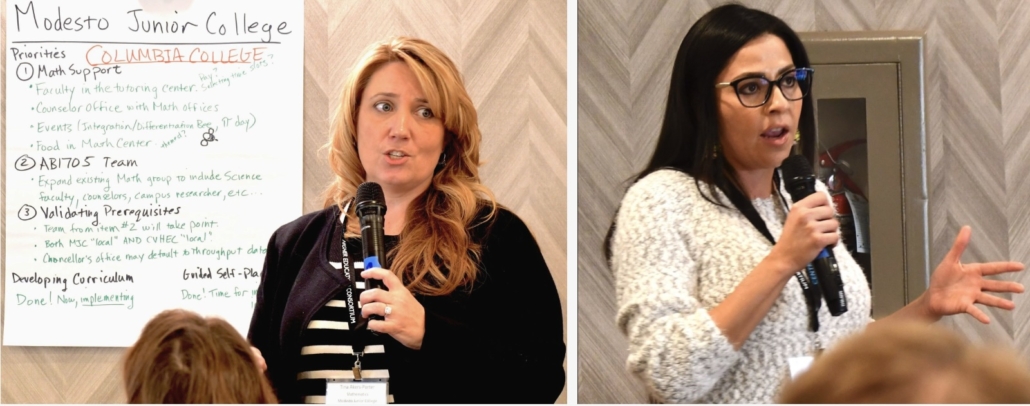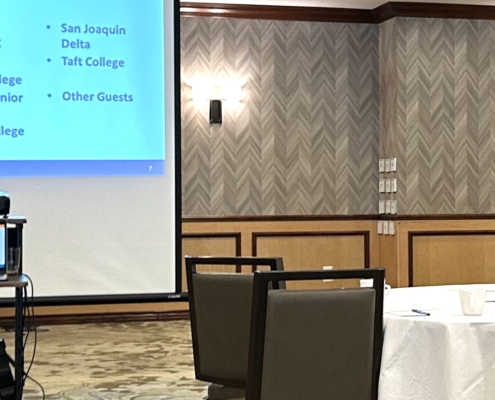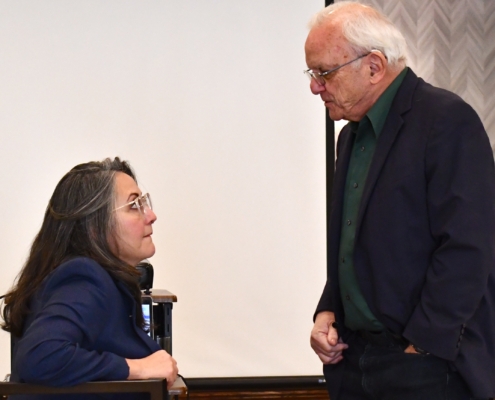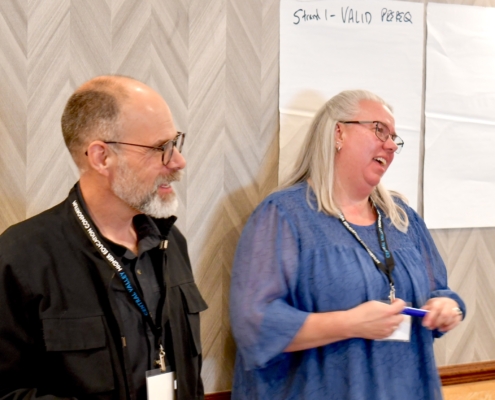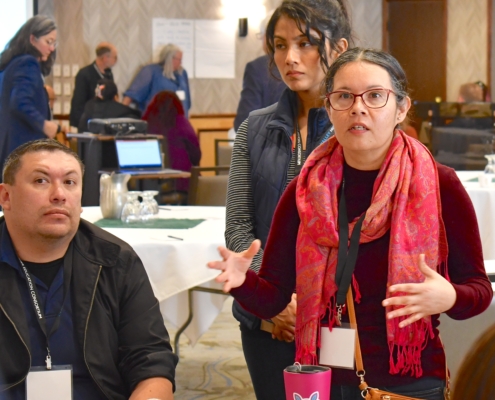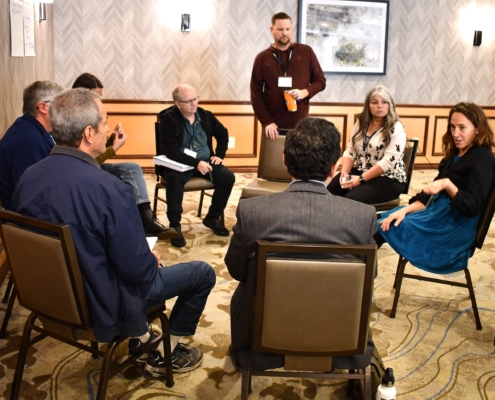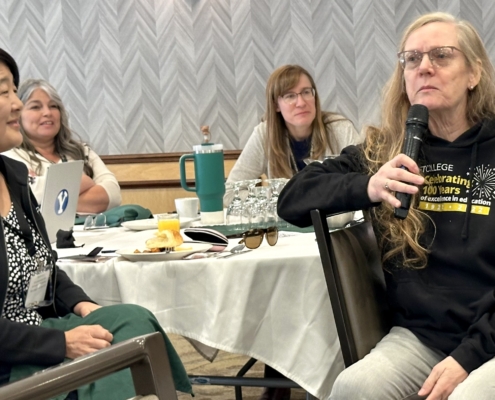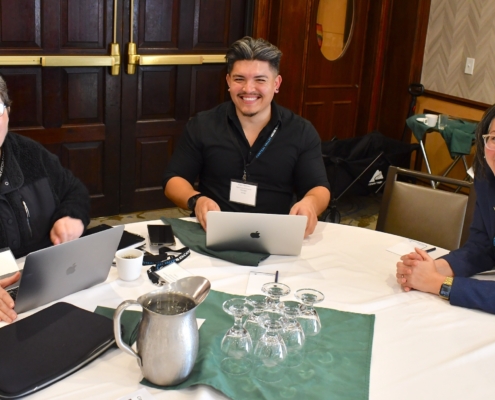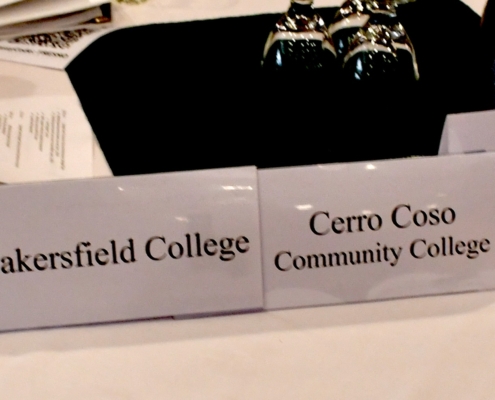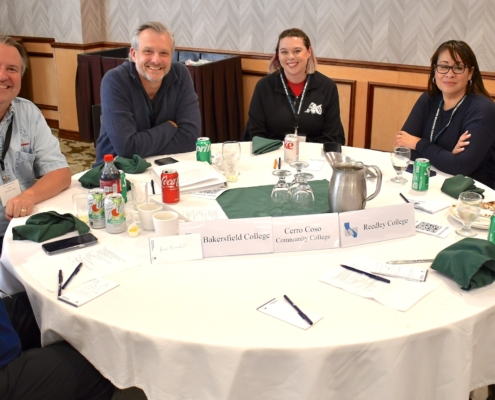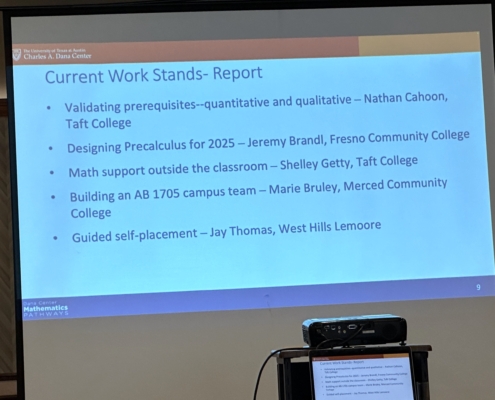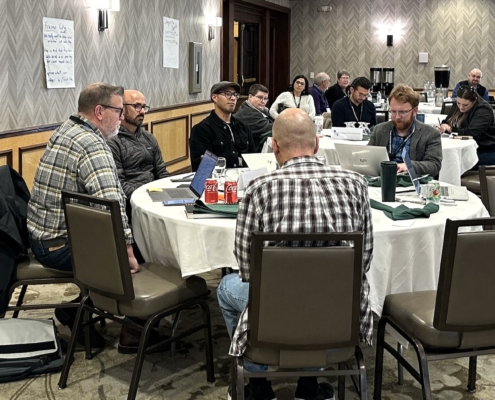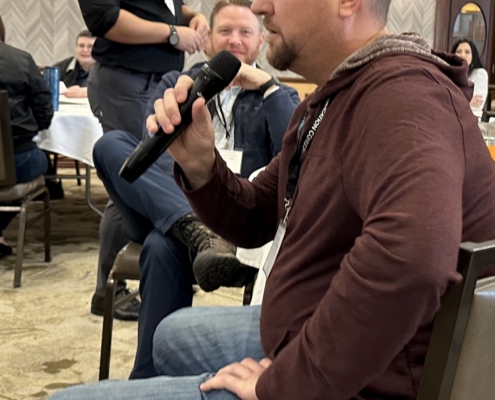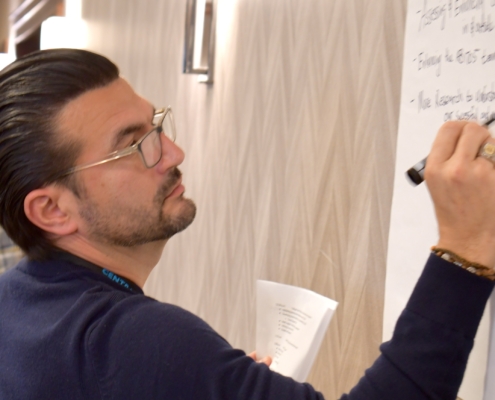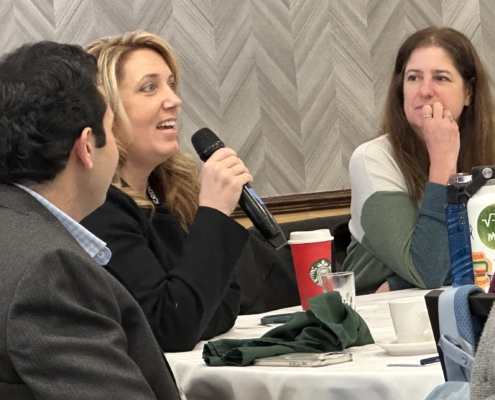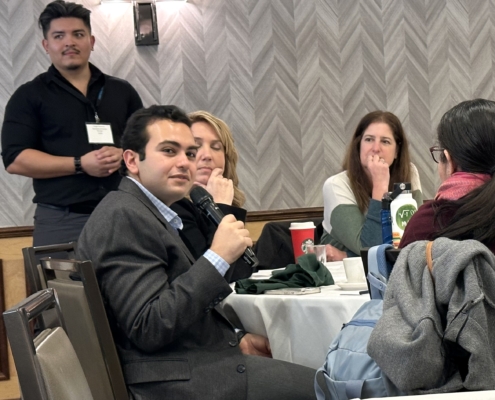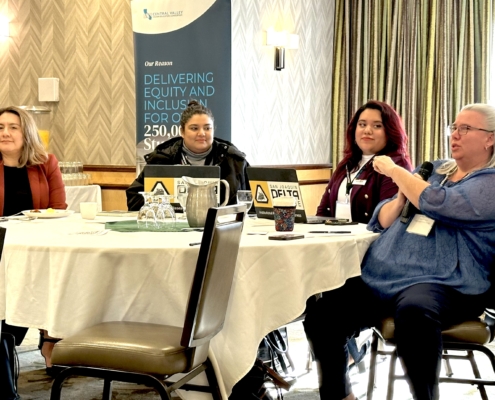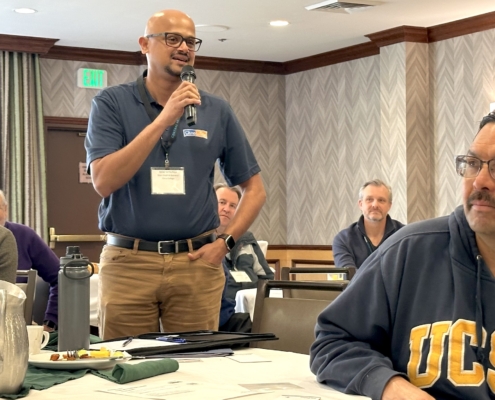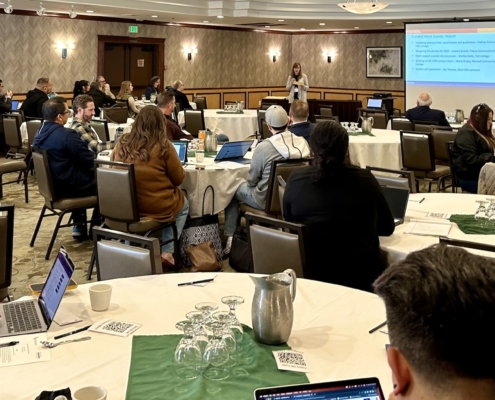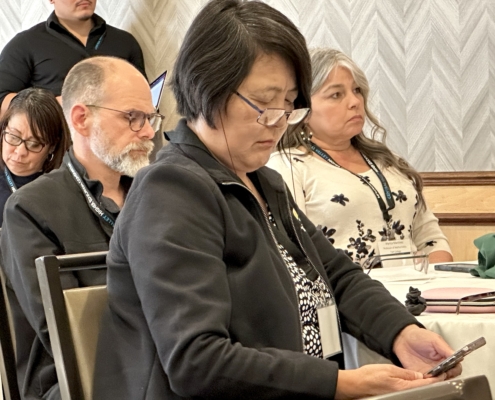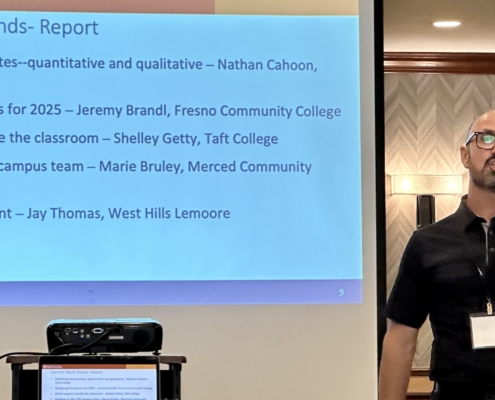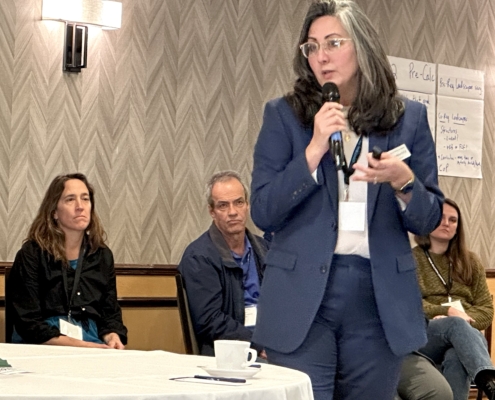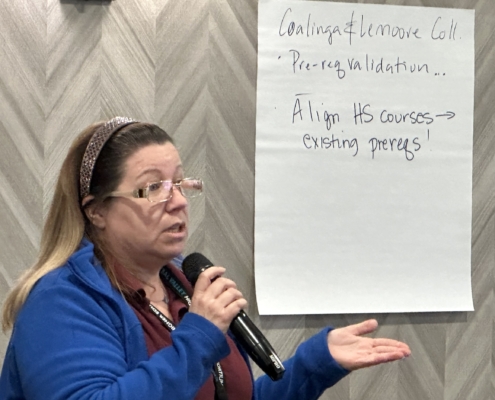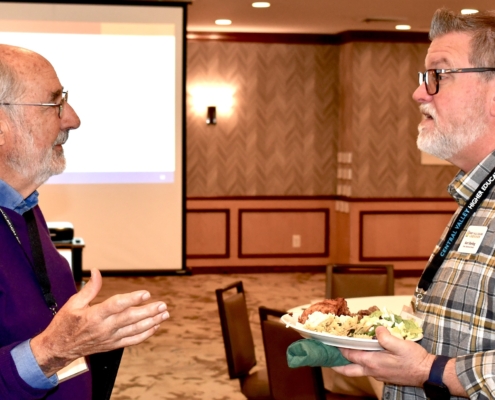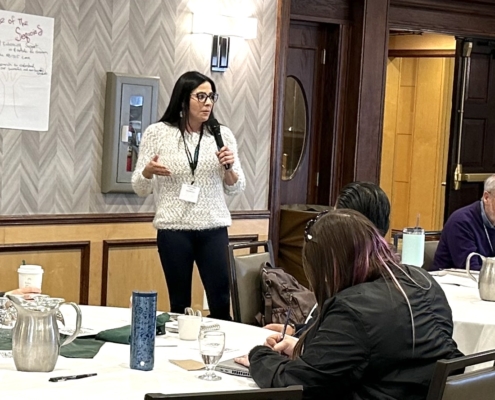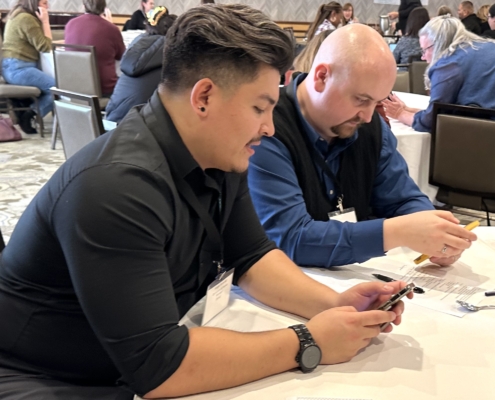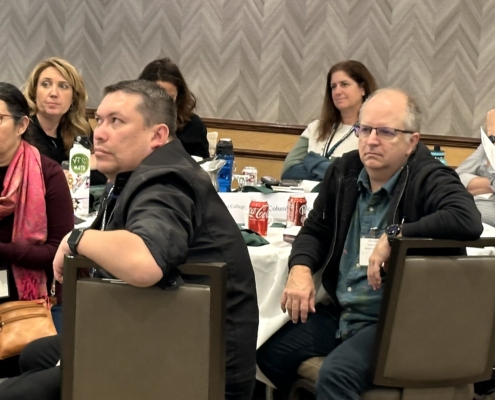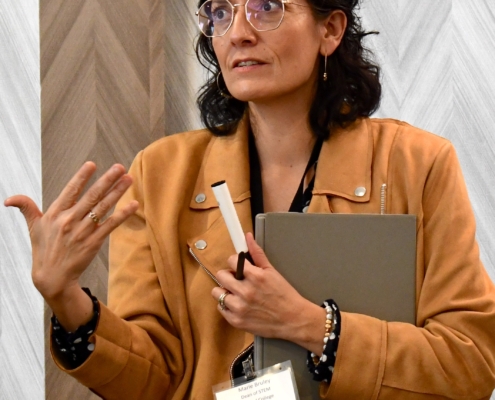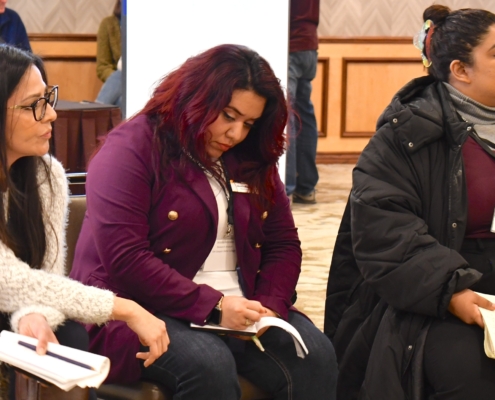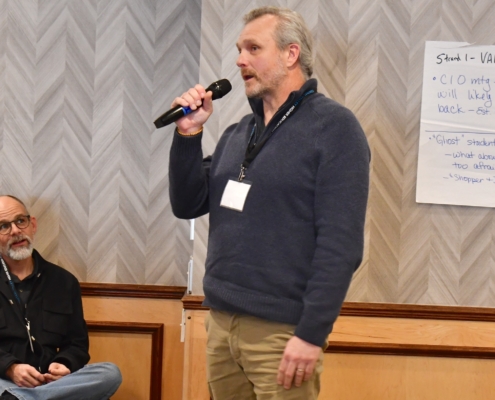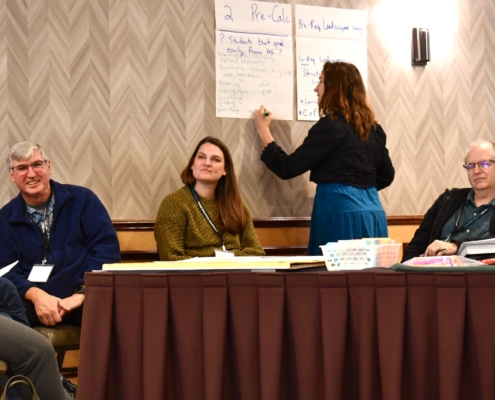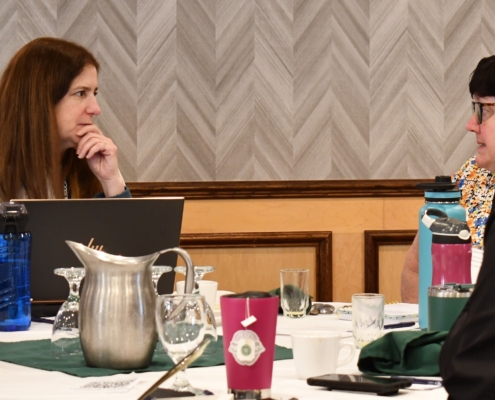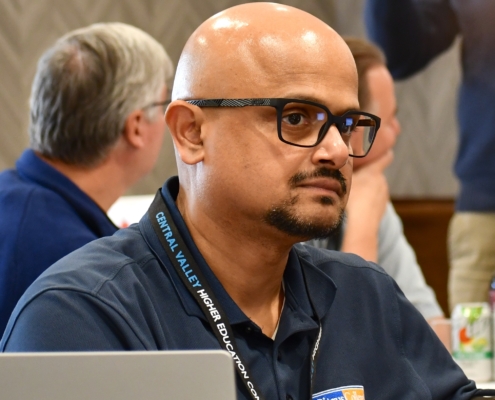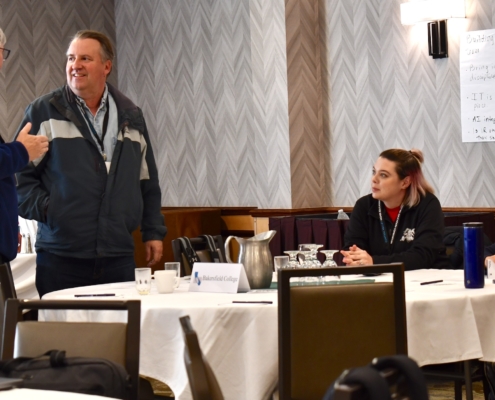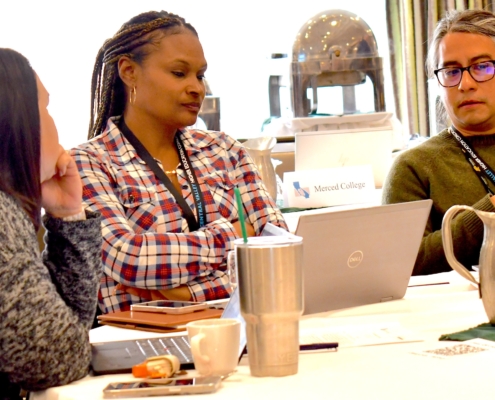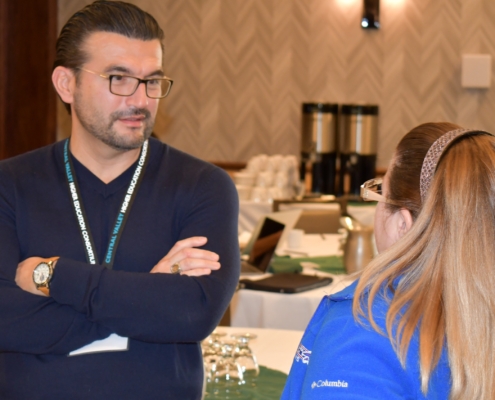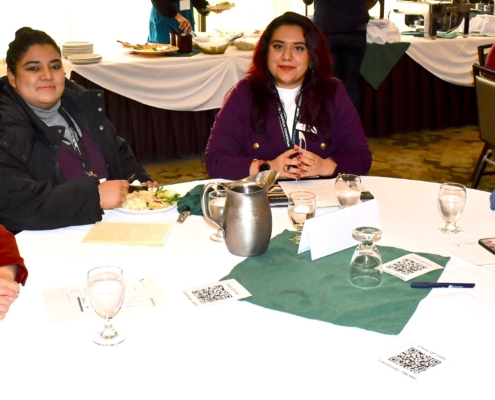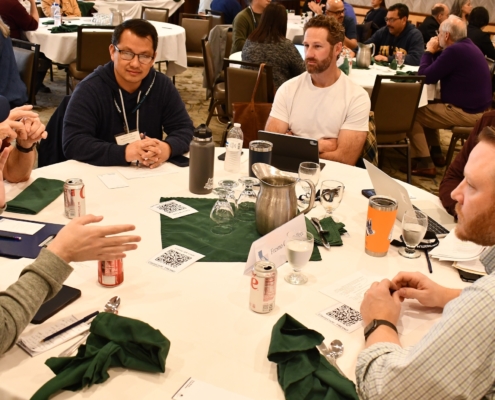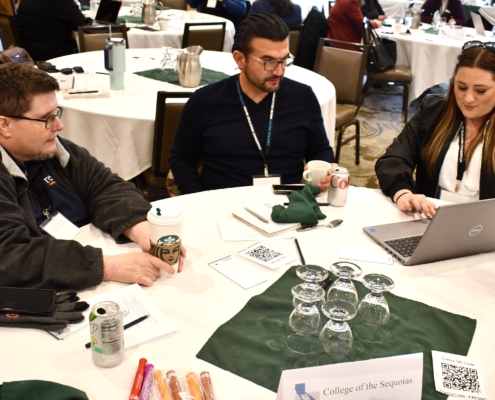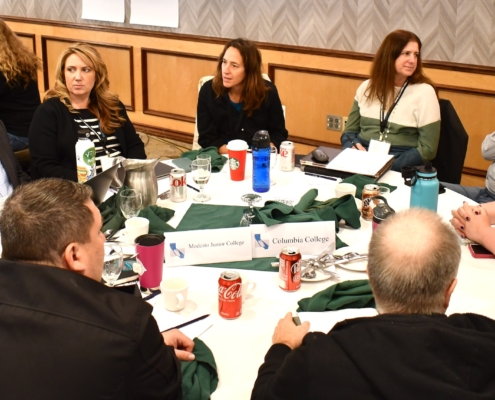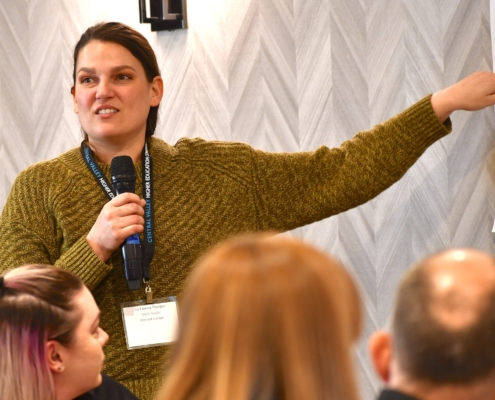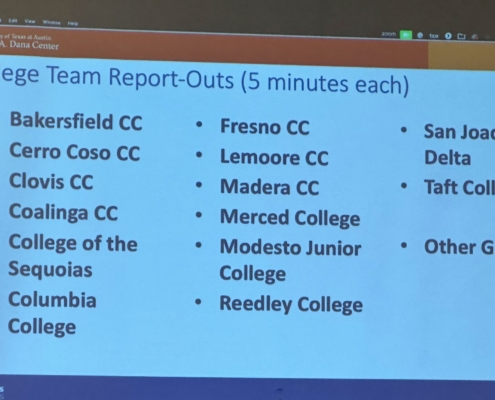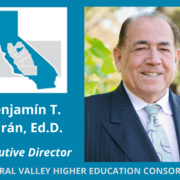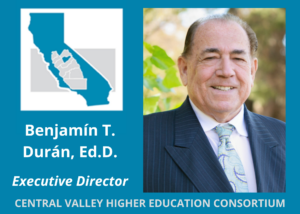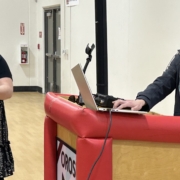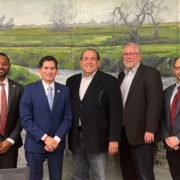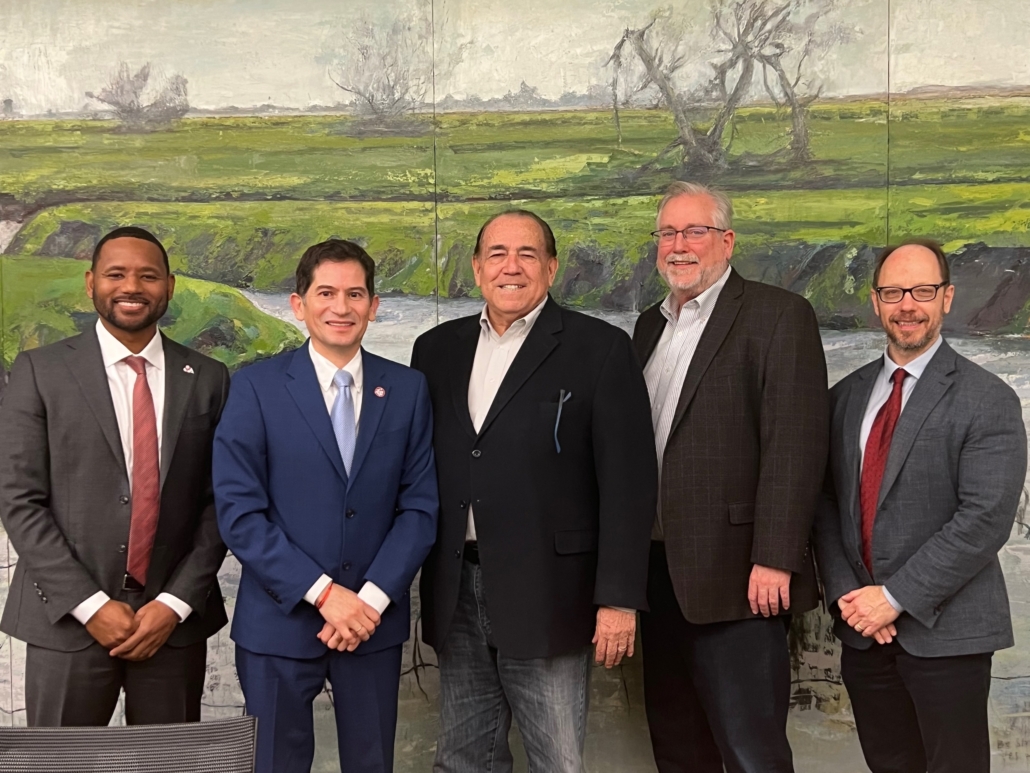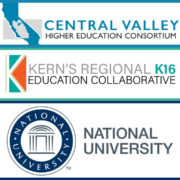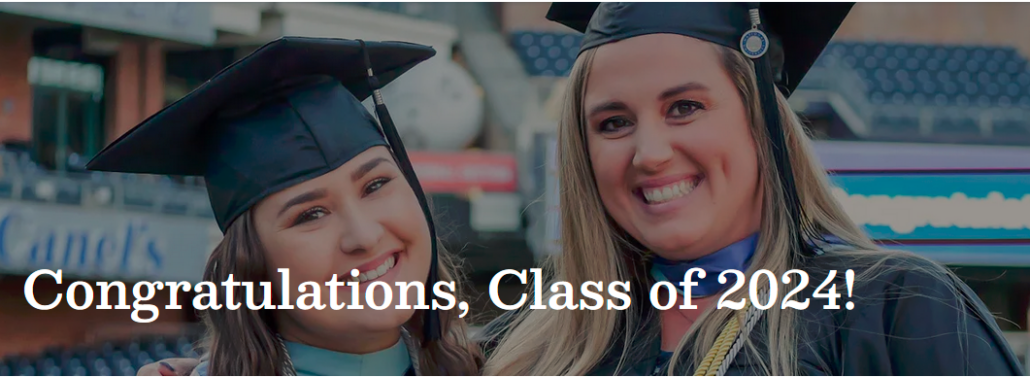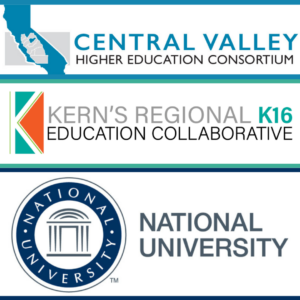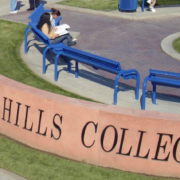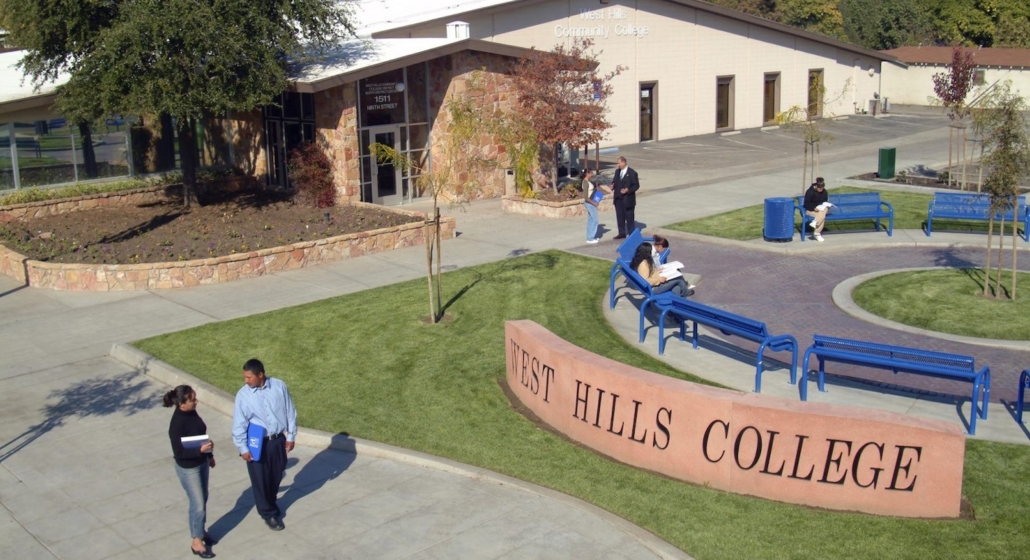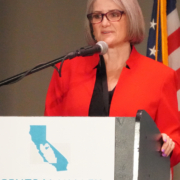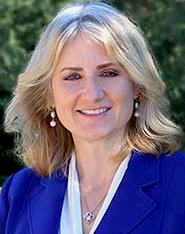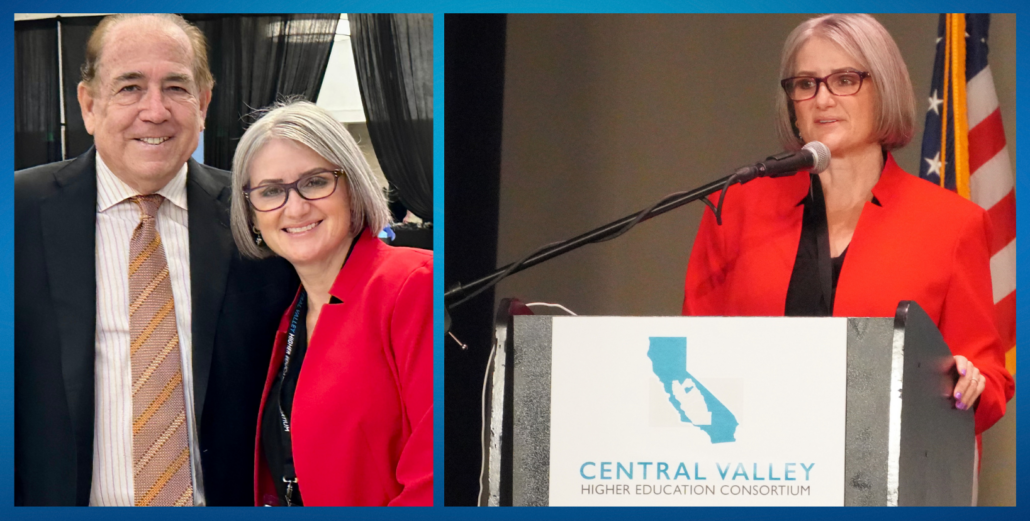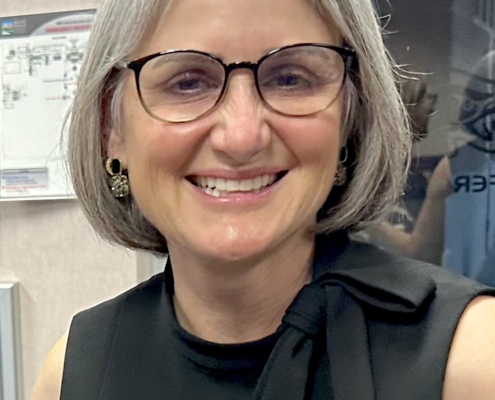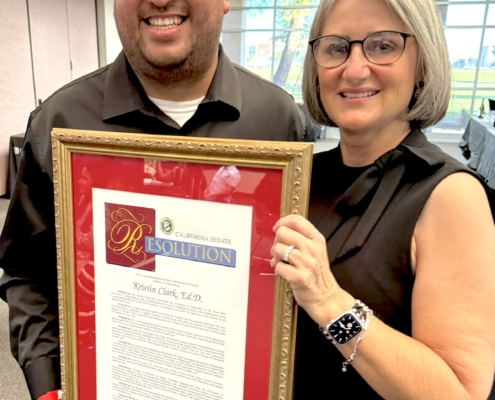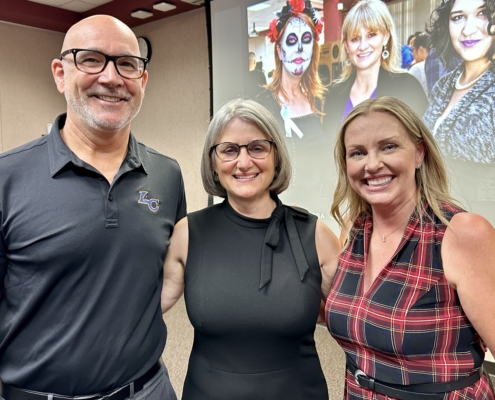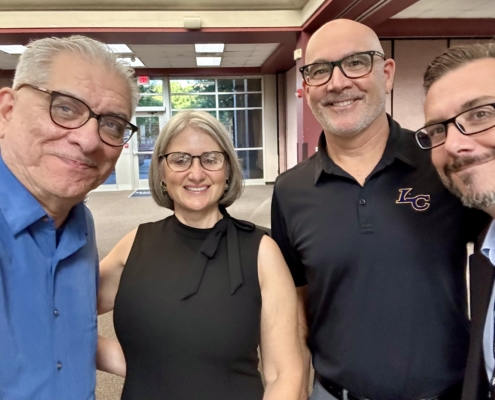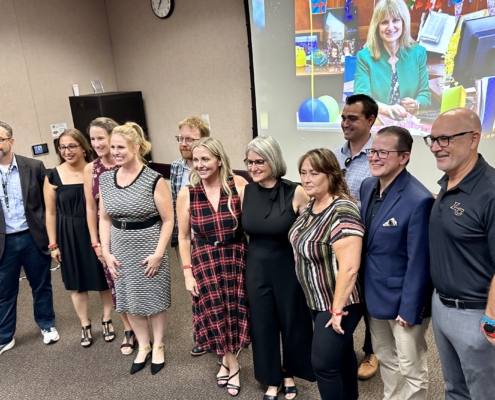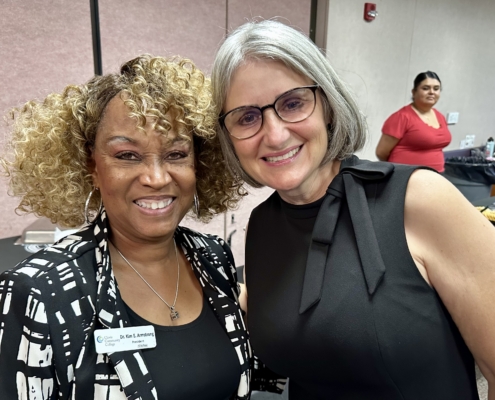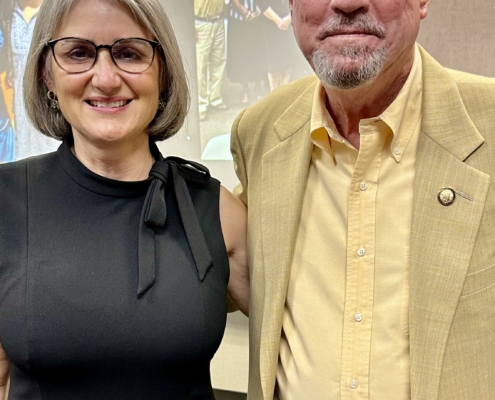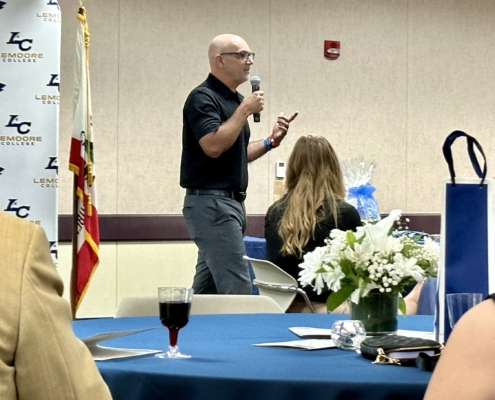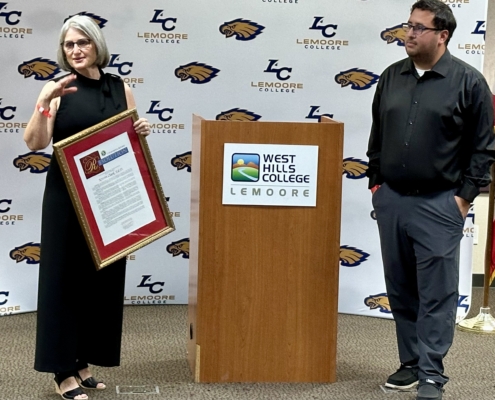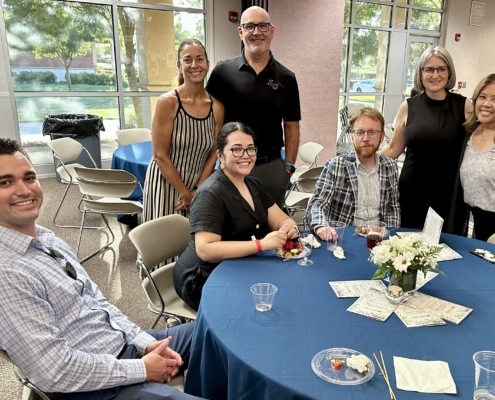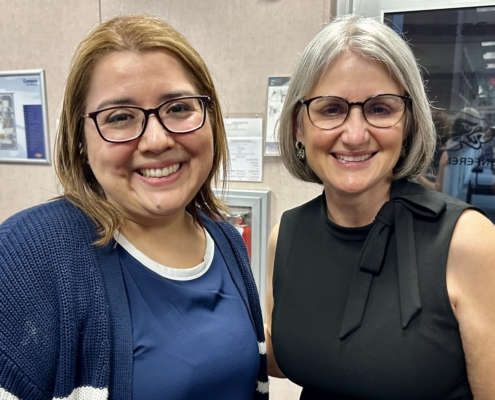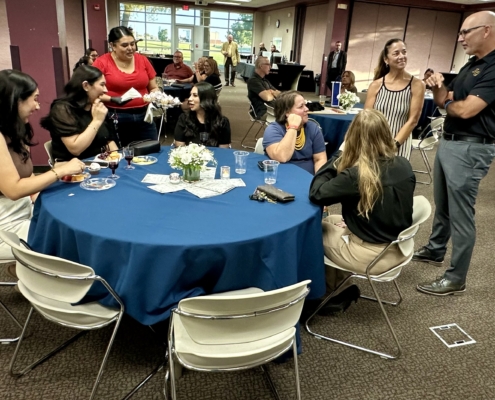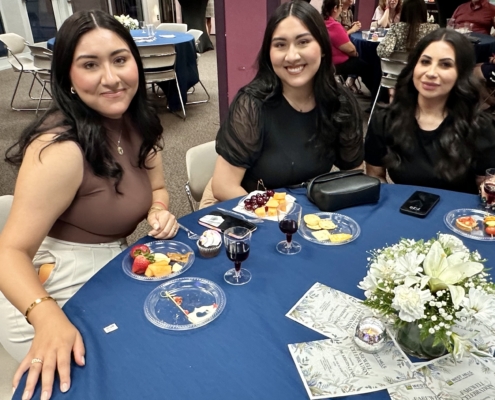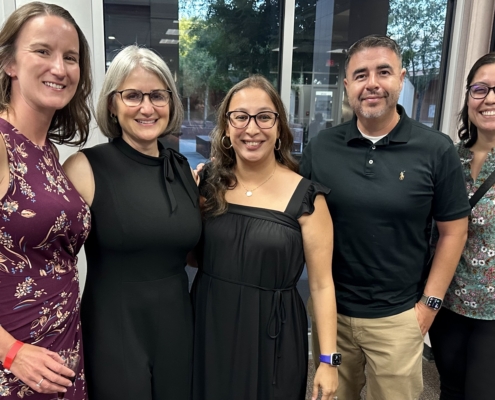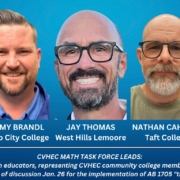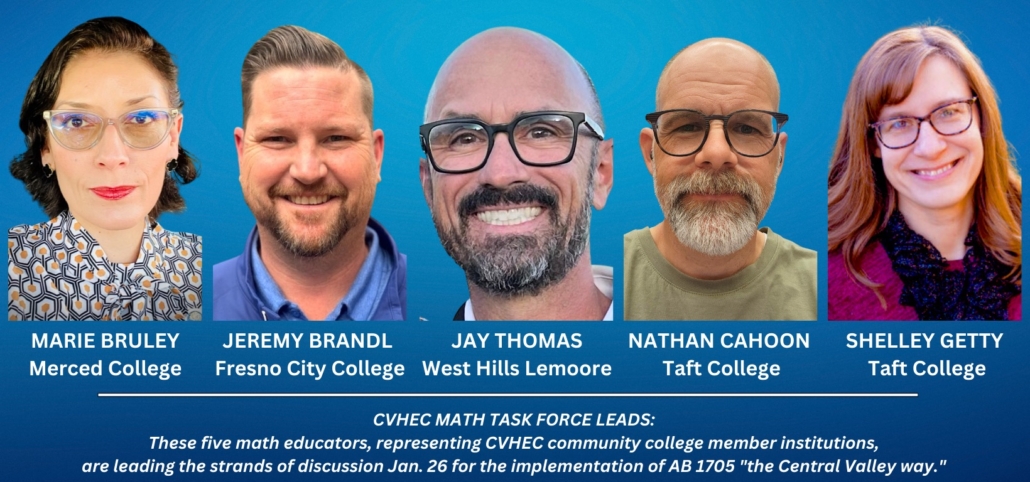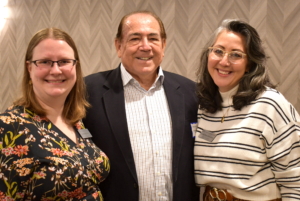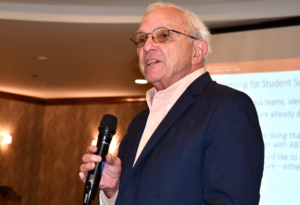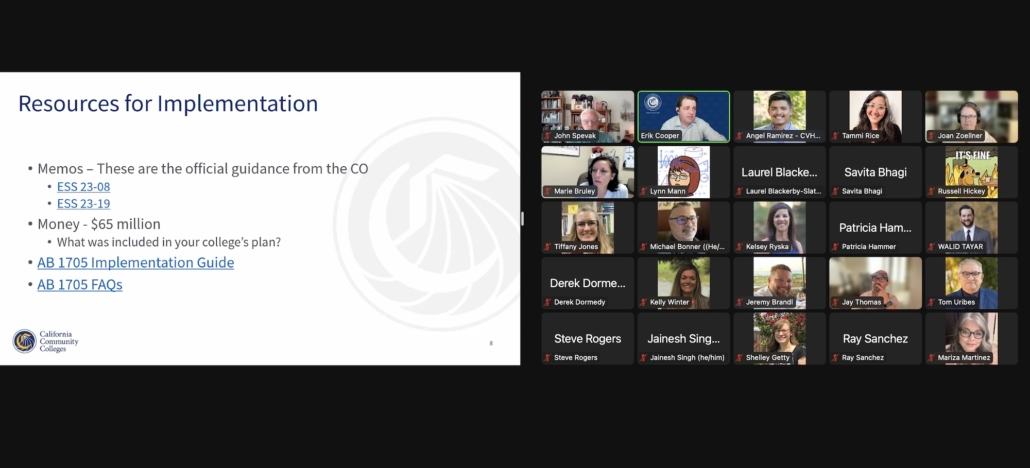MATH TASK FORCE: ‘Something extraordinary’ (Jan. 26 wrap)
Modesto Junior College math professor Tina Akers-Porter discusses her strand group’s deliberations at “The Central Valley Way to AB1705 Success” Convening Jan. 26 where a call for a “principals task force” by Orosi High School Principal Marlena Celaya would bring more secondary education voices to the table.
‘Something extraordinary is happening in math in California’s Central Valley’
Math Task Force latest AB1705 session leads to calls
for more data, high school input, re-convene April 19
BY TOM URIBES
CVHEC Media/Communications Coordinator
Realizing that state guidance surrounding Assembly Bill 1705 remains elusive, valley community college math educators and officials forged ahead at “The Central Valley Way to AB1705 Success” convening Jan. 26 in Fresno with a determined and unified mindset to develop implementation plans that will serve the best interests of their students including a follow-up session set for April.
In addition, the Central Valley Higher Education Consortium (CVHEC) Math Task Force discussion centered around five strands of curriculum planning for implementation before the law goes into effect July 1, two aspects emerged at the lively day-long work session: the increased participation of institutional researchers for pertinent data-collecting and a call for a “principal’s task force” to bring upper secondary education voices to the table.
Presented by CVHEC, the convening — the latest in a series of deliberations since fall — was attended by 82 representatives from the consortium’s 19-member community colleges, one high school principal and campus research professionals.
They agreed to reconvene April 19 for reports on follow-up work that will occur as a result of this most recent event. Registration for that event will open next month with additional details forthcoming.
Facilitated by the Charles A. Dana Center at the University of Texas at Austin, the session last month reviewed five strands of curriculum planning: Validating Prerequisites; Designing Precalculus for 2025; Math Support Outside and Inside the Classroom; Building an AB 1705 Campus Team; and Guided Self-Placement.
“With tensions high and little guidance surrounding AB1705, the 19 community colleges and districts that comprise the CVHEC nine-county region are rolling up their sleeves and getting to work on this math movement the ‘Central Valley Way’,” summarized Tammi Perez-Rice of the Dana Center.
Perez-Rice, who co-facilitated the event, said the convening was solely dedicated to working and planning at a regional and institutional level in two parts. The first part was dedicated to expanding the five work groups that emerged from the Nov. 17 webinar and creating a plan to move forward. The second half of the convening was devoted to institutional planning.
“The fruits produced from these convenings are already being felt around the region,” Perez-Rice said. “The plans and implementations emerging from these convenings are more than just a response to AB705 and AB1705; they cultivate systemic reforms that will benefit all students in the CVHEC region and beyond.”
John Spevak, CVHEC regional coordinator who oversees the consortium’s Math Task Force and co-facilitator of the Jan. 26 gathering, said in the short-term, the five strands work groups will continue to communicate and provide updates in preparation for the April 19 convening. The strand leads are preparing summaries of their Jan. 26 breakout discussions and member college teams are preparing summaries of the tentative plans they developed in the afternoon breakout sessions for oral reports in April.
“In the longer term, our Math Task Force will continue to monitor what the California Community College Chancellor’s Office says, while mainly going forward with our own Central Valley approach to the five strands.”
That “Central Valley Way” stems from the work undertaken by the CVHEC Math task Force, first formed in 2019, in the past year that was intensified with four work sessions beginning Oct. 6 in a virtual convening with CCC vice-chancellor Eric Cooper. The first in-person session followed Oct. 13 in Fresno and another virtual session was held in two parts Nov. 17 before the Jan. 26 session.
These sessions may represent the only concerted effort by a region’s community college math community actively meeting to collaborate across campus boundaries for ways to unite as one voice and determine a curriculum course of action that meets the law’s intent, Spevak said.
“We at CVHEC, along with the Dana Center representatives and our College Bridge partners in the Math Bridge Program, feel that something extraordinary is happening in math in the Central Valley of California,” Spevak said.
After the Jan. 26 session ended, Perez-Rice reiterated a point she made the first time she visited Fresno for the first in-person convening last fall:
“This collaboration today was amazing. As I travel and talk to math faculty all over the country, what I see pulsating from the CVHEC community here in Central California is just compassion; caring about their students; putting their students first; understanding what their students need; and more importantly collaborating with each other working across institutions to make things happen.”
Inviting secondary ed voices to ‘align syllabi’
A key development of the convening was the assertion and agreement that a crucial next step is “to involve high schools in the discussion and determine how to breakdown barriers between systems for a cohesive collaborative effort to put students first across the state of California,” a message delivered by Marlena Celaya, principal of Orosi High School who was the only secondary education official in attendance.
Celaya’s comments, first in a strand session and later in general comments before the assembled group, resonated with the community college professionals as she offered to lead a task force of principals/administrators who would unify with the CVHEC community college math educators for implementation strategy — to listen and hear what the needs are and how to meet those needs.
“I’m willing to lead this work because I don’t want people to go through the wars I went through teaching algebra and volunteering all my time,” said Celaya, a former math teacher at Dinuba High School. “We would want to hear from community colleges and say to them ‘what do you need?’
“We heard something from you today: ‘I want to know what courses are offered at the high school and what does that course description look like?’ Aligning syllabi is what I’d like to do,” Celaya said. “Mathematics is my passion.”
Perez-Rice said the April 19 convening promises more high school representation, with over twelve principals who are part of the Math Bridge Program by CVHEC and College Bridge being invited. Other secondary education officials from throughout the valley are welcome she said.
Participant feedback: ‘great to see we’re not alone in this …’
After the event, several participants shared their assessment of the Jan. 26 convening.
“The conversations were amazing and we really appreciated being here,” said Joshua Lewis, chair of the Bakersfield College Mathematics Dept.
“There have been so many legislative changes and so many unknowns it’s nice to see the work that other campuses are doing and realize that we’re not alone, that we have shared values; that we have shared emphasis on student learning and really care about doing right by all of our students,” he added.
Nathan Cahoon, Taft college math professor, felt that the efforts of CVHEC’s Math Task Force as exhibited at the convening is strengthening the voice of the valley’s math community which will have an impact.
“It was amazing to work with incredible professionals who have some really amazing ideas,” he said. “I know I took many good notes about ideas to implement at our college. The connections we are building here with each other will be powerful down the road as we build a cohesive effort to get some good research together that we can send to the state as one voice from all the colleges.”
Modesto Junior College math professor Marina Hernandez said coming together within the region is relished because when attending other statewide or national conferences, the focus is not as localized.
“It was very helpful to learn what other colleges in the Central Valley are doing because we share similar student population and resources characteristics and their best practices are applicable to us here in our region,” Hernandez said.
Tina Akers-Porter, Modesto Junior College math professor, said the Math Task Force work has helped her better understand what AB1705 is and what it means for her students.
“I feel like I have a better understanding of some of the challenges of the legislation and what others are worried about,” she said. “We share some of those worries but it’s great to hear different points of view on that. A byproduct of this is we are seeing how we need to support underprepared students more, inside and outside the classroom, and sharing ideas to do that.”
Shelly Getty, Taft college math faculty and a strand leader, echoed Akers-Porter: “We left knowing we are going to start some specific tutoring and targeting students for tutoring. We will try to advertise it better and recruit so students get more access to the services we already provide which will greatly impact them. We shared some good ideas on how to do that effectively.”
Marissa Martinez, Taft college math professor, said, “We have our work cut out for us. There’s a lot of things that we have to address with a lot of moving parts. Everything keeps changing but it was great to be able to see that we’re not alone in this, that we’re working together to better serve our students.”
She said this intercollegial collaboration and the feedback from the colleges helps “so we don’t have to reinvent the wheel — what worked, what didn’t work.”
Next steps? Data research
“I would say the next step is collecting our data to see how the numbers show where we are so we can prove that these courses are important for our student success,” Martinez said.
This data aspect was also a key part of the convening as institutional research professionals were invited and directly participated such as Arooj Rizvi, research analyst in the Office of Institutional research and Effectiveness at San Joaquin Delta College.
“Researchers have a monumental role in the implementation of AB 1705 because policymakers are going to depend a lot on what we are able to produce as a group or even as an institution,” Rizvi said. “Being a part of these conversations helps us to see the bigger picture, the context and the requirements of what exactly it is that we are looking for in the data.”
She said it was exciting to hear at the convening what area colleges are going through.
“I realized how similar our challenges are from institution to institution, “she said. “Working through that together and being solution-oriented is something that’s going to take all of us towards a beneficial direction. Seeing us all here today was a defining moment in history.”
Owynn Lancaster, vice president of academic strategy for CVHEC partner College Bridge, said the event was “a huge success seeing folks come together from math to talk about math and really pool their resources to address actual challenges.
“The most powerful focus of change in education is always the educator,” Lancaster said. “I know everything’s heaped on them but in a lot of ways they have the greatest power of the greatest agency for this.”
For more info: centralvalleyhec@gmail.com
For CVHEC media inquiries: Tom Uribes – cvheccommunications@mail.fresnostate.edu (or text 559.348.3278).
See also:
https://bit.ly/MTFconveneKSEE24
Valley’s math ed experts unite to address AB 1705 challenge for student success
The CVHEC Way to Math Success — Implementing AB1705
Math Task Force begins discussion of AB1705 implementation – Nov. 17 next
CVHEC Math Task Force meets in-person Oct. 13 for AB 1705 follow-up
NEWS RELEASE – CVHEC Math Task Force: Impactful legislation (AB 1705) Convenings Oct. 6 & 13
CVHEC Website Feature: Math Task Force Page
PHOTO GALLERY


